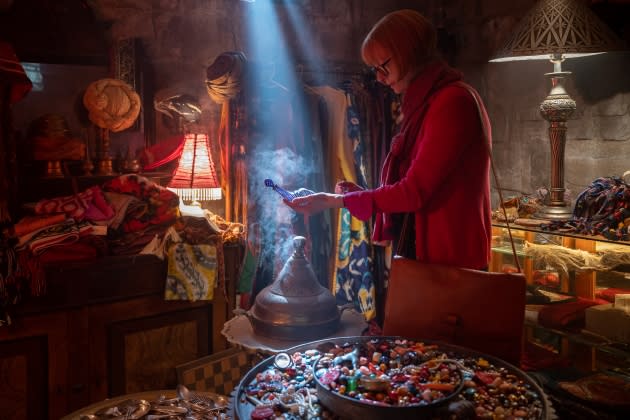Cannes Review: Tilda Swinton & Idris Elba In George Miller’s ‘Three Thousand Years Of Longing’

When ranging out of Mad Max territory, George Miller’s films are highly diverse and unpredictable in nature, and never has this proved more the case than with his time-traveling, narratively far-ranging new drama, Three Thousand Years of Longing. In this Cannes Film Festival out-of-competition entry, the director delves back into old texts to examine the nature and power of legendary stories that have endured for centuries in a way that is both sharply creative and a bit off-putting; the film begins on quite a high, only to slowly deflate as it works its way toward its modern-day ending.

Deadline
More from Deadline
Based on a 1994 short story, “The Djinn in the Nightingale’s Eye,” by A.S. Byatt and adapted by Miller and his daughter Augusta Gore, the film is bracing in its intelligence and thirst for inquiry, immoderately well made and carried to the highest levels of screen acting by two sensationally good actors, Tilda Swinton and Idris Elba, who remain center-screen throughout; no matter what they’re doing, you feel that you could watch these two forever.
Shot under highly regulated conditions during Covid, the film introduces itself with exhilarating swiftness and intelligence as Dr. Alithea Binnie (Swinton) arrives in Istanbul, where she is installed in her hotel’s “Agatha Christie room.” Miller introduces an extraordinary amount of information, nuance and feeling here in a very short period of time and never lets it feel like mere exposition; it’s superior, multi-layered filmmaking without at all showing off or allowing the audience to feel it.
In short order, Alithea is confronted by an extraordinary sight, that of a giant fellow in her room — he virtually fills the place — who speaks in ancient Greek (before resorting to English) and quickly mentions to her that he has all the time in the world. He can’t help but remind you of the Jolly Green Giant.
The Djinn, as he’s called, seems to wear no clothes, though you can’t quite tell what’s going on around his lower half. It’s hard to know what to make of him at first; is he a lost soul, a reject from another world forced to wander space and time forever, or is he looking for his moment to return to wherever he came from? The one physical trait distinguishing him from others are weirdly formed ears, which seem unnecessary and frankly distract from the otherwise perfectly formed aspects of his physique.
Alithea is, of course, enchanted by this unexpected encounter, as well she might be; how often do you get the chance to travel back in time with someone with intimate firsthand knowledge of the world as it once was? All the same, the journey is heavily shadowed by the question of why the Djinn is around in the current day and how he plans to deal with his exile, if such it is.
It’s a curious narrative construct, one that begins intriguingly but increasingly becomes a bit suspect and less than edifying. The yarn shortly turns to the realm of literary and quasi-religious myth by reaching deep into flash-back territory, courtesy of The Djinn.
As he laments, “I was left in my own oblivion” and has been “extravagantly unlucky” while nonetheless having been engaged in major legendary moments.
Miller clearly always has had an attraction for mutations of the mythical, and there are plenty of these here, as the Djinn guides Alithea through three different episodes, in exchange for which he will theoretically be granted his freedom. The first of these involves the Queen of Sheba, which is a story of unrequited love; the second involves a slave girl from the court of Suleiman; the third involves a love story gone awry in the 1850s.
It’s in these successive tales that the film bogs down to a degree; visually impressive, they nonetheless become overly emphatic while also pulling in characters who come and go quickly and are uniformly uninvolving and off-putting in the bargain.
Cannes Film Festival Palme d’Or Winners Through The Years: A Photo Gallery
The real story, that between the Djinn and Alithea, is sidelined through all of this, though of course it returns in the end, with considerable angst involved as the Djinn tries to decide upon his ultimate fate. The sweetness and intimacy are welcome, but by this point it’s not easy to put the bloom back on the rose.
Narrative issues notwithstanding, great pleasure ensues from the constant presence of both Elba and Swinton, who are alert to every possibility presented by the script and then add so much more to it in the bargain; both performances are nothing short of marvelous. Those with abiding interests in mythology and age-old stories will also take a special interest in it, and the work of longtime Miller cinematographer John Seale represents yet another reason to see this on the big screen.
Best of Deadline
NFL 2022 Schedule: Primetime TV Games, Thanksgiving Menu, Christmas Tripleheader & More
TV Cancellations Photo Gallery: Shows Ending In 2022 & Beyond
Sign up for Deadline's Newsletter. For the latest news, follow us on Facebook, Twitter, and Instagram.

 Yahoo Movies
Yahoo Movies 
